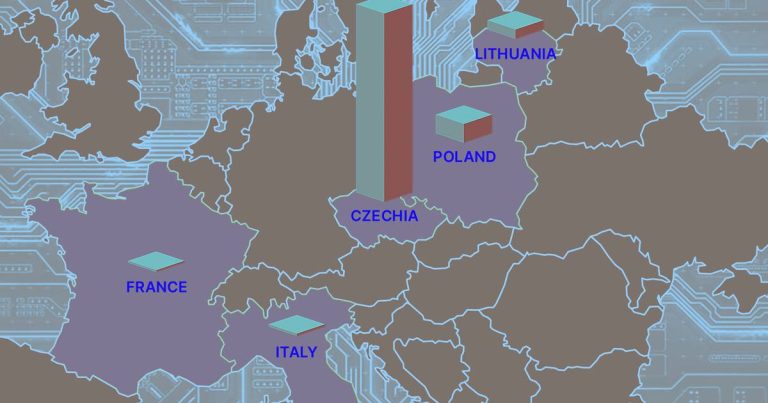- EU member states are drawing up new laws to facilitate cryptocurrency regulations in the bloc.
- Lithuania plans to tighten cryptocurrency regulation while Poland gives companies more time.
- The Czech Republic has the largest number of registered cryptocurrency entities among EU countries.
The cryptocurrency sector in the European Union is being revamped.
Countries across the 27-nation bloc are preparing for a new Markets in Crypto Asset Regulation, or MiCA, that will change the rules of the industry forever.
In February, Poland became the latest country to introduce laws to start a new system for the 1,187 companies registered there.
The transition begins
The overhaul marks the beginning of its transition to comply with the bloc's new rules for virtual asset service providers, or VASPs, by the end of 2024.
Stay ahead of the game with our weekly newsletters
“This law fills in all those details necessary for MiCA to work in Poland and for crypto asset service providers to be able to comply with it,” said Jaroslaw Nowacki, partner and founder of law firm tau.legal. DL News.
The Czech Republic, Poland and Lithuania have the largest number of cryptocurrency companies registered with local financial authorities, according to data collected by DL News.
Cheap, quick and easy registration processes have allowed dozens of companies to open branches, even if some are not physically present in these countries.
However, MiCA may put an end to the party as the landmark regulation sets tougher standards for companies offering cryptocurrency products.
Join the community to get our latest stories and updates
On the positive side, it would also allow companies to access the entire EU market with a license from a single member state.
Czech VASP
The Czech Republic tops the charts with 9,372 individuals and companies registered, according to figures last updated in May 2023.
The Czech authorities did not respond to this DL News Frequent requests for updated data. There is no online registration.
The Czech Republic and Poland both allow individuals to register as VASPs.
“They have a fair amount of work to do given that their current anti-money laundering regime is rather light.”
— Neil Samtani, CEO, VASPnet
While Poland is making strides towards implementing MiCA, the Czech Republic's roadmap is less detailed.
“The Czech Republic has a lot of work ahead of it with a large number of existing registrars to process and little reported so far on the progress of MiCA,” said Neil Samtani, CEO of VASPnet, a company that analyzes data on VASP providers. “. DL News.
Capital requirements
Lithuania comes in third place with 569 registered entities.
“Unlike Poland or the Czech Republic, registrants are mostly companies, not natural persons, most likely due to the minimum capital requirement of €125,000,” Samtani said.
Lithuania announced that it would tighten national laws related to cryptocurrencies in December, when authorities published draft laws that would override MiCA.
“They have a fair amount of work to do given their presence [anti-money laundering] “The system is fairly light touch and only involves a notification process,” Samtani said.
Card price
One way these countries have been able to attract more cryptocurrency entities to register is by offering cheap and efficient registration.
In the Czech Republic, the cost of notifying the regulator is around €40, in contrast to Italy, where companies can expect to pay €8,300 for registration.
In Poland, the new draft law indicates that obtaining a license under MiCA will cost a cryptocurrency project at least 4,500 euros.
Nowadays, it takes only two weeks and a fee of less than €150 to register as a VASP in Poland.
New systems
France is among the top five countries in the European Union when it comes to developing the cryptocurrency market. There are 103 VASP providers registered in France.
The country also leads the European Union in implementing MiCA. In July, the country created a MiCA-like system for new market entrants.
However, there is still a long way to go until the industry gets on board, and the clock is ticking.
SG Forge, the digital asset arm of Société Générale, is the only company in France licensed under the country's strictest MiCA regime.
Meanwhile, 129 entities are registered in Italy.
“Italy is currently holding open consultations on its implementation of MiCA, which suggests they have done the lion’s share of the work, and we likely will not see many changes to their proposed system,” Semtani said.
Transitional phase
Under MiCA, countries in Europe can choose to extend the deadline by which already registered companies must comply with the new laws by up to 18 months.
However, the European Securities and Markets Authority, which is overseeing part of the MiCA implementation, has warned that it should not take longer than 12 months.
Lithuania has decided to cancel the transition period and the MiCA laws will come into force on December 30. Italy recently announced a ten-month transition period.
Poland will give registered companies an additional year, Nowacki said.
“After the end of 2025, this current registry will cease to exist,” he told DL News. “Before this, companies could operate on the basis of the registration they currently had.”
But Poland's enrollment could shrink before the 2025 deadline, Nowaski said.
If a VASP fails to submit a quarterly data report to Poland's Financial Intelligence Unit, or if a company fails to respond to an audit request from regulators, it may be deleted from the CASP register.
Inbar Press is DL News Brussels correspondent. Contact the author at inbar@dlnews.com. Anna Čurić is a data journalist. Call her on ana@dlnews.com.

